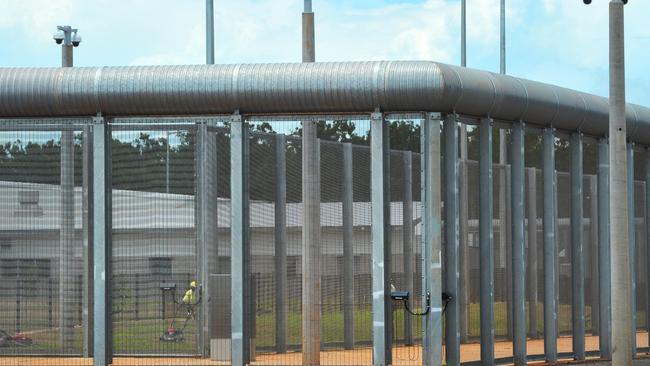Disabled women in Darwin’s Holtze prison are being cared for by fellow inmates due to a lack of services
Women with severe disabilities are being cared for by fellow prisoners at an Australian jail due to a lack of specialist health beds.
Police & Courts
Don't miss out on the headlines from Police & Courts. Followed categories will be added to My News.
Territory prisons are forcing women with disabilities to be cared for by fellow inmates with no training after an investigation revealed there were no specialist services for female prisoners.
When 23-year-old Evette Manakgu was put behind bars on remand there was no services to support her, Darwin Local Court heard on Monday.
Broadcast via video-link the young Kunwinjku woman rested her head on the table as legal jargon was debated about her around her.
She only looked up as the translator quietly explained what was happening.
Despite being assessed with a high-level disability requiring 24-hour support, Manakgu was not able to access the Complex Behavioural Unit in Holtze.
Instead, Manakgu was placed in the care of her aunty and fellow prisoner Karen Lawrence, while on remand for up to 19 days.

Police charged Manakgu with stealing, assault, robbery, disorderly behaviour and being in possession of a weapon, as well as alleged bail breaches.
Averting her eyes from the prison-link camera, Mankgu lifted her head and rested it on her aunty’s shoulder, who was supporting her through the bail application hearing.
Defence lawyer Megan Donahoe argued Manakgu should be released on bail given the lack of support.
“Ms Manakgu has been accepted into the complex support needs branch of the National Disability Insurance Scheme,” Ms Donahue said.
“There is no complex behaviour unit for women (in Holtze), so there is no option for her.”
Ms Donahue said the prison psychiatrist, Sarah Dorrington, had confirmed in an email the “issues Ms Manakgu does have in custody”.
Despite three charges of breaching bail, Prosecutor Russ Hammill said “we understand that therapeutically the best course is that she is in community rather than in prison”.
Ms Donahoe said Manakgu had a “low level ability” to learn from her experience in Holtze and her client would be making a not-guilty plea on the grounds she was unfit for trial.
Judge Tanya Fong Lim granted bail and adjourned the matter to January 12 to the mental health diversion list.
NT Corrections confirmed women with disabilities do not have access to specialist units inside of Darwin’s Correctional Centre, also known as Holtze Prison.
An Attorney-General and Justice Department spokesman said there were 34 beds in the Complex Behavioural Unit allocated to male prisoners, 14 of those were for men with moderate to severe conditions who required special needs care.
He said a further 20 beds were allocated to male prisoners with lower categories of needs.
However, there were no allocated beds for women with disabilities.
“If there are females with significant diagnosed mental health needs, they may be referred to care options via the Department of Health,” he said.
The spokesman said under a workers’ program, prisoners could elect to become a carer for fellow inmates.
“Prisoners with a diagnosed impairment may receive care from a fellow prisoner where appropriate and where specialist residential care is not required,” he said.
“These carers provide assistance with cell hygiene tasks and provide general assistance throughout the day in relation to meals, moving between areas or sectors and other tasks as required.”
There are four male carers and one female carer in Darwin Correctional Centre who perform duties that do not require any formal training, the spokesman said.



